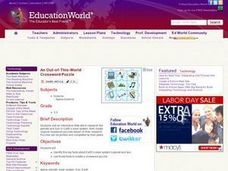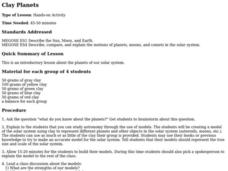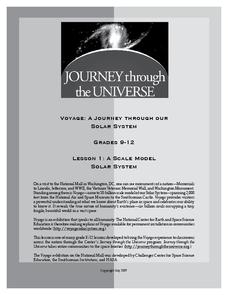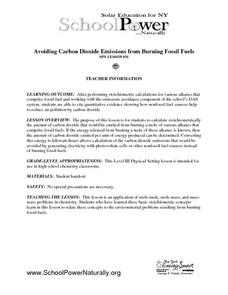Curated OER
Solar System Slide Show
Students work in small groups to research a planet in our Solar System in order to compare it to Earth. They examine the planet's size, atmosphere, rotation and revolution periods, temperature, and other attributes. They collect...
Curated OER
Solar System
In this space science worksheet, students complete each statement with the correct word or phrase related to the solar system. Then they locate each of the planets in a word search that follows.
Curated OER
The Solar System
In this solar system word puzzle activity, students use the 17 clues regarding the solar system to fill in the blanks in the crossword puzzle.
Curated OER
Our Solar System
Learners investigate the coincidental parade of planets and witness dramatic views of the solar system by researching websites and participating in online activities. They write about their findings.
Curated OER
The Solar System
In this Solar System worksheet, students choose categories (ex. size, shape) and fill in the information for 14 bodies in the solar system. These include Mercury, Venus, Earth, Comets, etc.
Curated OER
The Solar System Word Search
In this solar system word puzzle activity, students examine the 26 words and names in the word bank and locate them in the word search puzzle.
Curated OER
GED Vocabulary: Earth and Space Science
In this earth and space science worksheet, students complete a crossword puzzle given seven clues and seven terms about earthquakes, the solar system, and convection currents.
Curated OER
An Out-of-This-World Crossword Puzzle
An interactive web site allows students to create crossword puzzles online after researching planets and Sun in the Earth's solar system facts. They complete crossword puzzles created by classmates.
Curated OER
Redesign the Rover: Mars Research Year-Round
Students discuss the solar system, the planets, periods of orbit and revolution. For this space lesson students discuss the importance of the study of Mars and brainstorm ideas on how NASA might solve its Rover design problem.
Curated OER
Theories
Pupils view a series of videos that explore the development, formation and arguments for the geocentric model of the solar system. Studenst investigate the heliocentric model of the solar system and consider how scientific theories...
Curated OER
Clay Planets
Have your class learn about the solar system using this hands on technique. Learners review what they know about the planets, and create a clay model of the solar system. There are a list of resource links to make this instructional...
California Academy of Science
Kinesthetic Astronomy: The Meaning of a Year
How many times have you traveled around the sun? Aspiring astronomers grasp what a year is and they differentiate between orbit and rotation by walking around the sun right within your classroom. Place a lamp in the center of the room to...
Curated OER
What is the Solar System?
Students study the solar system. For this solar system lesson, students create graphic organizers, and participate in class demonstrations illustrating size and distance within the solar system.
Space Awareness
Know Your Planets
Does your class know their planets? Implement an activity that has them describing the solar system, identifying properties of the planets, and placing them in order from their distance from the sun.
University of California
Seasons Lab Book
Unlock the mystery behind seasonal change with a collection of worksheets and activities. Whether they are drawing pictures of Earth's orbit around the sun or graphing the temperature and daylight hours of different locations from around...
Journey Through the Universe
A Scale Model Solar System
Between the time scientists discovered Pluto and reclassified it as a dwarf planet, it did not even make one full revolution around the sun. In two activities, scholars investigate scale models and their properties. Pupils find that it...
Laboratory for Atmospheric and Space Physics
Planetary Distances on the Playground
There's no need to stay inside; get out of the classroom and create a scaled map of the solar system on your playground field! In collaborative groups, scholars identify the distance between the sun and other planets, place planet...
Lake Afton Public Observatory
Shadows, Angles, and the Seasons
Shine some light on the topic of seasonal change with this collection of activities. Whether it's by measuring the change in the length of their shadows, or modeling the earth's orbit around the sun using a lamp and a globe, these simple...
University of Texas
Observing the Moon
Why does it look like there is a man on the moon? Why does the moon look different every night? These are the focus questions of a lesson that prompts class members to observe and record the nightly changes of Earth's natural satellite.
Curated OER
Space and Science Fiction
Use the Franklin Institute's exhibition "An Inquirer's Guide to the Universe" to have students research ideas for a science fiction story. After completing their research, writers will compose science fiction stories that incorporate...
Curated OER
Avoiding Carbon Dioxide Emissions from Burning Fossil Fuels
Chemistry and earth science meet in a instructional activity on carbon dioxide emissions. After reading about atmospheric problems caused by using fossil fuels, science stars balance equations for the burning of different alkanes. They...
Curated OER
Blazing Gas
Fourth graders read and discuss the sun and the energy we use on Earth from the sun. In this sun lesson plan, 4th graders discuss the solar system, planets, and answer short answer questions.
Curated OER
Earth, Sun and Moon
Students explore, experiment and study how the Earth orbits the Sun once a year and how the moon takes approximately 29 days to orbit the Earth. They access an online activity to examine the process of how the Sun is at the center of the...
Curated OER
An Internet Lesson on the Planets
Sixth graders research one of the planets in the solar system based on questions that they develop using information from the Internet. They create a travel brochure using the research information.

























